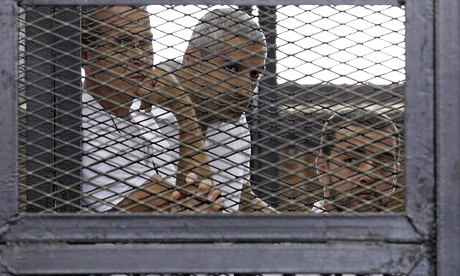Last Sunday, June 22, Secretary of State John Kerry traveled to Egypt with a message of friendship and partnership. After meeting with Egyptian Foreign Minister Shoukry and having a "candid and comprehensive discussion" with the country's newly elected President, Abdel Fattah el-Sisi, Kerry remarked to reporters that the United States and Egypt remained critically important geostrategic partners in an overwhelmingly hostile and unpredictable region. Sure, the U.S.-Egyptian relationship has had it's ups and downs since Hosni Mubarak was pushed out of office over three years ago, but the two country's continue to view one another as allies on a whole host of international security issues. Tee up Kerry:
"I came here today to reaffirm the strength of the important partnership, the historic partnership between the United States and Egypt, and also to consult on the critical situations that we face in the region - obviously, particularly Iraq, Syria and Libya. After three difficult years of transition, the United States remains deeply committed to seeing Egypt succeed. We want to see the people of Egypt succeed, and we want to contribute to the success of the region."
What a difference 24 hours makes. Fastforward to Monday afternoon, and you saw the same John Kerry incredulous and disturbed over a farcical prosecution and conviction of three Al-Jazeera English journalists for simply doing their jobs. The three reporters, Peter Greste, Mohamed Fahmy, and Baher Mohamed, were found guilty by a Cairo court for spreading false news, endangering Egypt's national security, and working with a Muslim Brotherhood movement now designated by the Egyptian Government as a terrorist organization.
For prosecutors, the sentence was an example of an independent Egyptian judiciary at work. For the United States and many other foreign leaders around the world, from Great Britain to Australia, that same sentence was a vivid reminder of Egypt's grotesque reality: that of a country dominated by the military, where the right to a fair trial, a free press, and free expression are blatantly crushed.
Words like "chilling," "draconian,"disturbing," and "incompatible" are not normally terms that the United States uses when speaking about an ally. Yet all of these words were used by the State Department and the White House after the Al-Jazeera ruling. "Today's conviction," Kerry said in a press release, "and chilling, draconian sentences by the Cairo Criminal Court of three Al Jazeera journalists and fifteen others in a trial that lacked many fundamental norms of due process, is a deeply disturbing set-back to Egypt's transition." And the prosecution, the White House warned, "represents a blow to democratic progress in Egypt."
The U.S. did not stop with those words. Instead, the White House and State Department both demanded that President el-Sisi either commute the sentences of the journalists, or issue pardons for their immediate release. In just the second full week on the job, President el-Sisi is now faced with a serious foreign policy challenge that could potentially define the course of the U.S.-Egypt strategic relationship: either ignore the court's ruling and thus implicitly acknowledge that the verdict was bogus, or anger a country that provides Cairo with $1.3 billion every year.
Ever since the July 2013 removal of former President Mohammed Morsi by the Egyptian military, there has been a potent feeling on Capitol Hill from Republicans and Democrats alike that Egypt is doing two equally harmful things to the country's democratic prospects: 1) deliberately stalling the transition process to a fully-empowered and inclusive civilian government, and 2) flagrantly violating the very democratic principles that it claims to support. Senator Patrick Leahy (D - VM), one of the most important lawmakers in the U.S. foreign assistance debate, was so concerned about Egypt's trajectory that he delayed a $650 million installment of financial assistance over what he cites as Cairo's "flouting of human rights and appalling abuse of the justice system." Senator Robert Menendez (D - NJ), Chairman of the Foreign Relations Committee, commented just after el-Sisi's inauguration that the new Egyptian leader would have a "rude awakening" if he thought business would continue as usual. Senators John McCain (R - AZ) and Lindsey Graham (R - SC) have uttered similar complaints this year.
If el-Sisi doesn't blink and allows the three journalists to languish in jail, he may find out just how serious U.S. lawmakers are.

